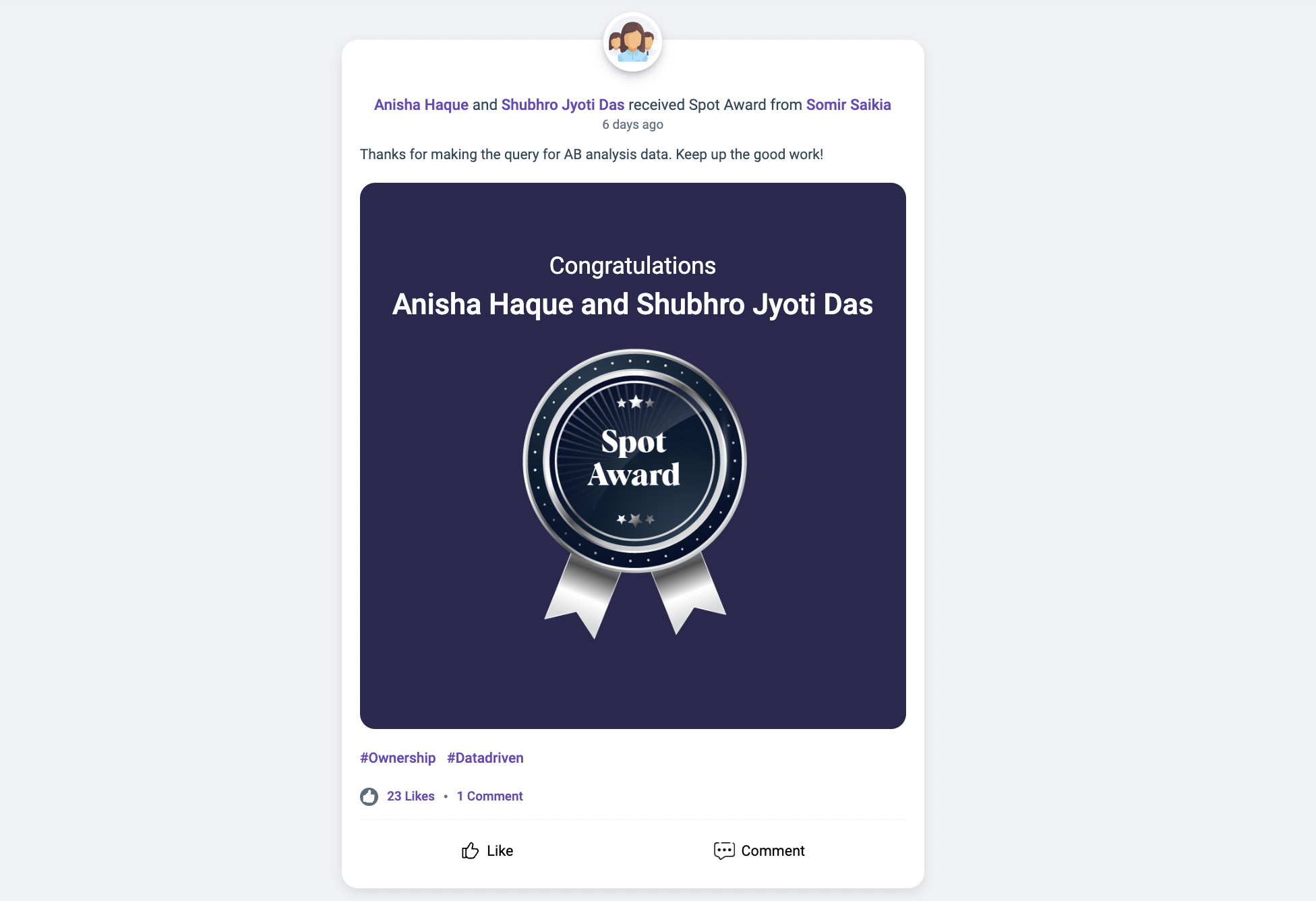Beyond the Paycheck: Why Gen Z Values Recognition Over Salary

A Global Employee Recognition and Wellness Platform
The workforce transformation underway today represents more than demographic change; it signals a fundamental recalibration of what drives employee engagement and organizational commitment. The traditional value proposition, i.e., competitive salary and comprehensive benefits, is no longer sufficient to attract and retain the workforce that will drive your organization's next decade of growth.
Gen Z, now comprising 27% of the global workforce and projected to reach 30% by 2030 (Johns Hopkins), is rewriting the rules of employee engagement with expectations that extend far beyond compensation.
This shift in values presents both a strategic challenge and an opportunity for leaders. It calls for a shift from traditional compensation models to more holistic approaches that prioritize employee recognition and professional development. Organizations that successfully navigate this transition will build competitive advantages through stronger employee advocacy, increased productivity, improved retention rates, and more effective talent pipelines.
The data underscores the urgency of this transition: organizations that have adapted their recognition strategies to Gen Z preferences are seeing 35% higher employee engagement (inFeedo). Meanwhile, companies clinging to legacy engagement models are experiencing talent hemorrhaging at unprecedented levels, with Gen Z turnover rates reaching 44% in traditional corporate environments.
This represents more than an HR challenge; it constitutes a strategic business imperative that directly impacts your organization's capacity to innovate, scale, and compete. Companies that recognize this shift early and adapt their leadership approach accordingly will secure a decisive advantage in the war for talent.
The Evolving Value Matrix of Gen Z in the Workplace

Gen Z employees entering today's workforce represent more than demographic turnover; they signal a fundamental restructuring of workplace priorities that demands strategic recalibration from organizational leaders. Their formative experiences through rapid technological advancement, economic volatility, and cultural transformation have produced expectations that prioritize career growth and personal fulfillment over traditional financial motivators.
The evidence reveals a decisive shift in workplace values: 72% of Gen Z employees prioritize job satisfaction over salary. This generation views compensation as necessary but insufficient. They seek roles that provide purpose, growth opportunities, and developmental environments that align with their whole person (previous generations bifurcated this into professional & personal) trajectory. This perspective represents a strategic departure from previous generations, where competitive compensation and benefits served as primary retention drivers.
Organizations that recognize and respond to these evolving expectations achieve outcomes that extend beyond employee satisfaction. They build stronger internal advocacy networks, enhance their employer and market brand positioning, and create more effective succession planning pathways.
The strategic focus must shift toward providing growth opportunities, meaningful recognition, and continuous learning experiences rather than relying exclusively on salary increases or traditional compensation structures.
Recommended Resource: Flexible Workforce Rewards: Meaning, Challenges, Importance & Implementation
Purpose-Driven Workplace Culture: The Gen Z Imperative

The Gen Z workforce operates from a fundamentally different definition of professional success, one that prioritizes purpose alignment over traditional career markers. This generation seeks roles that connect their daily contributions to meaningful outcomes, viewing work as an extension of their values rather than merely a source of income.
Deloitte's 2025 Gen Z and Millennial survey findings confirms this trend: 89% of Gen Z believe that having a sense of purpose is crucial for their job satisfaction and overall well-being.
However, purpose manifestation varies significantly across individuals. Some focus on direct societal impact through their role, while others prioritize skill acquisition and financial growth that enables external change initiatives.
This purpose-driven mindset creates strategic opportunities for organizations willing to integrate recognition with meaningful work experiences. Leaders can leverage this alignment by incorporating purpose-focused elements into comprehensive recognition programs:
- career growth opportunities,
- mentorship frameworks,
- flexible work arrangements, and
- targeted skill development initiatives.
The business case for purpose-driven engagement proves compelling: 80% of Gen Z employees prefer workplaces that offer career growth opportunities, mentorship, and recognition over those providing higher salary packages.
Organizations that successfully align their mission with Gen Z's values create competitive advantages that extend beyond talent attraction. They cultivate employees who become authentic advocates for organizational goals and culture.
This approach requires creating environments where purpose-driven work drives daily operations, providing employees with opportunities to contribute to meaningful projects while ensuring company values align with Gen Z priorities. The result is enhanced belonging and commitment that translates into measurable business outcomes.
Why Recognition Matters More Than Money for Gen Z

While compensation remains a fundamental component of the employment value proposition, Gen Z's definition of workplace value extends significantly beyond financial considerations. Recognition has emerged as a more powerful engagement driver than monetary rewards alone, fundamentally altering how organizations must approach talent engagement and retention strategies.
This shift stems from Gen Z's redefinition of success and fulfillment metrics. Unlike previous generations who prioritized financial stability as the primary career indicator, Gen Z seeks validation, purpose alignment, and clear professional development pathways. They require confirmation that their contributions are valued across multiple dimensions—financially, emotionally, and intellectually.
Recognition manifests through various strategic mechanisms, each serving distinct organizational functions:
- Top-down recognition from leadership reinforces company values alignment while boosting morale and reinforcing desired behaviors.
- Private recognition through personalized feedback creates a genuine connection and demonstrates individual value.
- Peer-to-peer recognition strengthens collaborative networks, building trust and enhancing cross-functional engagement.
- Formal awards and achievement celebrations establish accomplishment frameworks, while
- Professional development opportunities function as recognition vehicles that offer growth and skill-building pathways.
The strategic implications extend beyond individual satisfaction metrics. Recognition serves as a catalyst for building a stronger organizational culture and sustainable employee advocacy.
Financial compensation alone cannot retain top Gen Z talent. Recognition has become a critical component of comprehensive engagement strategies. Acknowledging contributions, accomplishments, and incremental progress builds deeper emotional connections to organizational objectives, translating into higher retention rates, increased referral quality, and stronger internal support for strategic initiatives.
Moreover, studies show that Gen Z expects continuous feedback and real-time acknowledgment of their contributions, making quarterly, semiannual, and annual review cycles insufficient for engagement maintenance. This real-time validation requirement drives continued excellence by reinforcing the significance of their work. Recognition validates their professional journey and output simultaneously, creating workplace dynamics that prioritize emotional rewards alongside monetary compensation. As a result, it establishes a foundation for sustainable employee engagement and organizational advocacy.
How Leaders Can Adapt to Gen Z's Recognition Expectations (or Ignore It at Your Own Peril)

Successfully adapting to Gen Z recognition preferences requires more than tactical adjustments. It demands a comprehensive approach to employee engagement that drives measurable organizational performance. This generation expects consistent visibility, acknowledgment, and validation throughout their professional experience. Organizations that effectively meet these expectations create competitive advantages through enhanced employee advocacy, improved retention metrics, and strengthened organizational culture.
Here's how leaders can implement recognition strategies that deliver both employee satisfaction and business results.
1. Establish Continuous Recognition Protocols
Gen Z values consistent acknowledgment over periodic performance evaluations. Implementing regular check-ins and real-time feedback mechanisms creates meaningful differences in engagement levels.
Recognition should occur immediately following achievements, whether through team meetings, internal communication channels, or formal recognition platforms. This approach establishes continuous engagement loops that maintain employee connection to organizational objectives while motivating higher-level contributions.
2. Implement Transparent Communication Frameworks
Transparency is key to building trust. Gen Z expects clear communication regarding performance expectations, career progression pathways, and available advancement opportunities. Leaders must encourage open dialogue, provide constructive feedback, and ensure comprehensive inclusion in all employee interactions.
Implementing employee pulse surveys that assess engagement levels and provide immediate, real-time feedback from employees creates platforms for Gen Z to express their perspectives while demonstrating organizational commitment to their input.
3. Deploy Technology-Enabled Recognition Systems
Gen Z's digital-native background creates expectations for technology integration throughout their work experience and career development journey. Platforms like Vantage Circle enable leaders to create seamless recognition experiences integrated into daily workflows.

This alignment with Gen Z's preference for digital solutions ensures recognition remains continuous and meaningful while providing data insights that inform broader talent management strategies.
4. Foster Collaborative Recognition Networks
Gen Z thrives in collaborative environments that facilitate peer feedback and appreciation exchange. Encouraging peer-to-peer recognition significantly enhances community belonging and team cohesion.
Leaders should create structured opportunities for employees to recognize each other's contributions, fostering supportive environments where all contributions receive validation. This builds collaborative networks essential for cross-functional success and organizational resilience.
5. Connect Recognition to Career Development Pathways
Gen Z employees expect recognition to connect directly with their career advancement trajectory. Recognition programs should encourage professional progress through -
- structured mentorship programs,
- participation in workshops and conferences,
- transparent promotion processes, and
- public acknowledgment of skill development efforts.
This approach helps employees understand that recognition forms part of their larger growth trajectory while simultaneously building the organization's internal talent pipeline and succession planning capabilities.
The Path Forward
Gen Z's transformation of workplace engagement represents a fundamental shift in talent strategy and competitive positioning. While compensation remains essential, recognition, purpose-driven work, and continuous growth opportunities have emerged as primary drivers of employee commitment and organizational advocacy.
Organizations that prioritize recognition, mentorship, and career development create sustainable competitive advantages that extend beyond employee satisfaction. They build stronger advocacy networks, enhance talent pipelines, and develop resilient cultures capable of thriving in competitive markets.
Market leadership in the coming decade will belong to organizations that understand recognition as a strategic capability rather than an operational afterthought. Recognition-driven engagement strategies will determine which companies successfully compete for and leverage the talent that drives future growth.
















